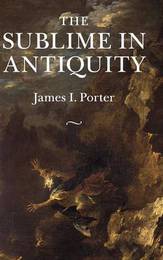
|
The Sublime in Antiquity
Hardback
Main Details
Description
Current understandings of the sublime are focused by a single word ('sublimity') and by a single author ('Longinus'). The sublime is not a word: it is a concept and an experience, or rather a whole range of ideas, meanings and experiences that are embedded in conceptual and experiential patterns. Once we train our sights on these patterns a radically different prospect on the sublime in antiquity comes to light, one that touches everything from its range of expressions to its dates of emergence, evolution, role in the cultures of antiquity as a whole, and later reception. This book is the first to outline an alternative account of the sublime in Greek and Roman poetry, philosophy, and the sciences, in addition to rhetoric and literary criticism. It offers new readings of Longinus without privileging him, but instead situates him within a much larger context of reflection on the sublime in antiquity.
Author Biography
James I. Porter is Chancellor's Professor of History and Theory of Rhetoric at the University of California, Berkeley. An authority on ancient criticism and aesthetics and an important figure in classical reception studies, he is the author of The Origins of Aesthetic Thought in Ancient Greece: Matter, Sensation, and Experience (2010), Nietzsche and the Philology of the Future, and The Invention of Dionysus: An Essay on The Birth of Tragedy (both 2000), as well as the editor of several collections. He is also co-editor of the Classical Presences series. The present book is the second installment in a trilogy, the aim of which is to bring back into focus ancient aesthetic thinking and to uncover its forgotten traditions.
|